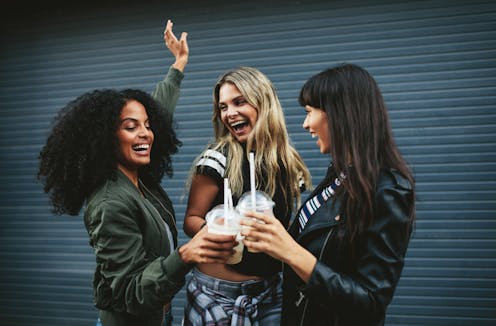why indulging in small, affordable pleasures can help you cope with tough times
- Written by Kokho Jason Sit, Senior lecturer in Marketing; Associate Head (Global), University of Portsmouth

Life today is stressful. Since the start of the pandemic, social media has been flooded with coping mechanisms and wellbeing trends to help people manage their emotions and worries about the state of the world. If you’ve tried therapy[1] and “hot girl walks”[2], you may also have heard of the latest life hack: buying yourself a little treat[3].
Inflation and high cost of living is putting holidays and luxury goods out of reach. In their place, indulgences like coffees, ice cream, lipstick or face masks can deliver pleasure in small doses. Treats are not expensive, nor are they a huge commitment. The ideal treat might be from a shop within walking distance of your home or office. You might even think of an episode of “guilty pleasure” television as a treat – a mid-afternoon Emily in Paris break, for example.
“Treat culture” is not an entirely new concept. You may have heard it called the “lipstick index[4]”, the theory that consumers buy low-cost luxuries to boost their moods in difficult times. There is a wealth of research on “compensatory consumption”[5], where people spend money[6] to deal with perceived threats to their self-esteem, confidence or happiness. Treat culture is “retail therapy”, but with a focus on small, inexpensive purchases rather than a shopping spree.
Treat responsibly
Treat culture could easily be seen as a negative indulgence. It suggests frivolous spending, a lack of self-control and ignorance of financial risks like debt. Some commentators have argued that treat culture preys on young consumers’ insecurities, for example, about their skin[20], perpetuating a cycle of needing to buy more skincare products in search of easy “fixes” for imperfections.
But treat culture, I believe, is a low-risk way to experience a morsel of happiness in dark times. The cost is usually minuscule (a bubble tea costs around £5), and you probably won’t be tempted to use a buy-now-pay-later scheme to finance it. To fully experience the satisfaction of treat culture, you should be able to purchase and consume the product in person, for optimal instant gratification. So, spending debt is unlikely and post-purchase remorse is unnecessary.
Treat culture certainly has psychological benefits, helping uplift consumers’ emotions[21] during difficult times. So, go ahead – buy yourself a little treat.
Read more: Buy now pay later: Klarna is courting young shoppers with Paris Hilton and TikTok-style algorithms – here's why it's a problem[22]
References
- ^ therapy (theconversation.com)
- ^ “hot girl walks” (www.stylist.co.uk)
- ^ little treat (fortune.com)
- ^ lipstick index (www.bbc.co.uk)
- ^ “compensatory consumption” (www.cambridge.org)
- ^ spend money (doi.org)
- ^ This article is part of Quarter Life (theconversation.com)
- ^ Cost of living crisis: what are your rights if your landlord wants to increase your rent? (theconversation.com)
- ^ Five ways to be a good ‘housemate’ to your parents (theconversation.com)
- ^ Expert advice for budding UK entrepreneurs during a cost of living crisis (theconversation.com)
- ^ recent research (doi.org)
- ^ Flying Tiger (www.theguardian.com)
- ^ bubble tea (www.vice.com)
- ^ pointed out (www.michigandaily.com)
- ^ nurturing and protective qualities (www.psychologytoday.com)
- ^ kawaii (cute) products (journals.sagepub.com)
- ^ Research shows (www.sciencedirect.com)
- ^ positive emotions (www.youtube.com)
- ^ WAYHOME studio/Shutterstock (www.shutterstock.com)
- ^ about their skin (www.wellandgood.com)
- ^ uplift consumers’ emotions (psycnet.apa.org)
- ^ Buy now pay later: Klarna is courting young shoppers with Paris Hilton and TikTok-style algorithms – here's why it's a problem (theconversation.com)







